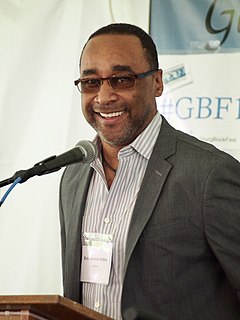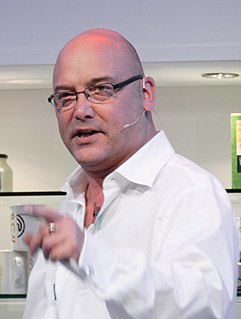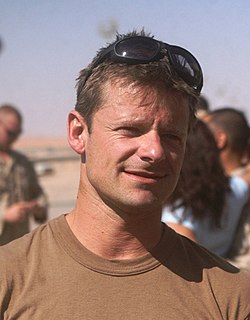Top 1200 Rewriting History Quotes & Sayings - Page 5
Explore popular Rewriting History quotes.
Last updated on December 19, 2024.
Biographical history, as taught in our public schools, is still largely a history of boneheads; ridiculous kings and queens, paranoid political leaders, compulsive voyagers, ignorant general the flotsam and jetsam of historical currents. The men who radically altered history, the great scientists and mathematicians, are seldom mentioned, if at all.
I'm not the creative one. I know that. If Rory Storm hadn't come along... and then The Beatles... I would have continued running around in teddyboy gangs. Today, well... I'd probably be a laborer. I'm glad I'm not, of course. It'll be nice to be part of history... some sort of history anyway. What I'd like to be is in school history books and be read by kids.
Muslims naturally saw Christendom as their arch rival. One point that is really important to bear in mind, particularly in addressing an American audience, and that is that the Islamic world has a very strong sense of history. In the Muslim world, history is important and their knowledge of history is not always accurate but is very detailed. There is a strong historical sense in the Muslim world, a feeling for the history of Islam from the time of the Prophet until the present day.
What experience and history teach is this - that nations and governments have never learned anything from history, or acted on any lessons they might have drawn from it. Variant: What experience and history teach is this - that people and governments never have learned anything from history, or acted on principles deduced from it.
Under Ronald Reagan in the United States and Margaret Thatcher in the U.K., there was a rewriting of the basic rules of capitalism. These two governments changed the rules governing labour bargaining, weakening trade unions, and they weakened anti-trust enforcement, allowing more monopolies to be created.
After school, I went to Damascus to study law and history, which I didn't really like. I didn't like history, in particular. In Syria, the regime was trying to present to us a distorted version of the past. Assad was shown as the father of history. So I decided to shift to film, which was something I had always loved as a teenager.
I've always loved history, from my youngest memories. My father enjoyed the great stories of history, like Hereward the Wake, Robin Hood, and Richard the Lionheart, and he shared them with me. I went on to do a degree in history, though I found it rather dry, because it was mostly about politics rather than dashing individuals!
I've benefited greatly from studying many effective people from history. Among those who've influenced me the most are Ronald Reagan, Theodore Roosevelt, and Winston Churchill. Each of the three altered history; each was self-created to a great extent; and each was a great student of history and leadership.
What is history? Any thoughts, Webster?' 'History is the lies of the victors,' I replied, a little too quickly. 'Yes, I was rather afraid you'd say that. Well, as long as you remember that it is also the self-delusions of the defeated. ... 'Finn?' '"History is that certainty produced at the point where the imperfections of memory meet the inadequacies of documentation." (quoting Patrick Lagrange)
Science fiction is the most important literature in the history of the world, because it's the history of ideas, the history of our civilization birthing itself. ...Science fiction is central to everything we've ever done, and people who make fun of science fiction writers don't know what they're talking about.
For everything is history: What was said yesterday is history, what was said a minute ago is history. But, above all, one is led to misjudge the present, because only the study of historical development permits the weighing and evaluation of the interrelationships among the components of the present-day society.
I have always lived in a world in which I'm just a spot in history. My life is not the important point. I'm just part of the continuum, and that continuum, to me, is a marvelous thing. The history of life, and the history of the planet, should go on and on and on and on. I cannot conceive of anything in the universe that has more meaning than that.
Writing by myself, I spread that out more. I'll spend more time on a song then. I'm more critical about it, because there's no one else in the room to tell me, 'That's really not translating. I'm not getting what you're saying.' So, I'm constantly rewriting it, thinking, 'No, that's fine,' and going back.
Rewriting isn't just about dialogue, it's the order of the scenes, how you finish a scene, how you get into a scene. All these final decisions are best made when you're there, watching. It's really enjoyable, but you've got to be there at the director's invitation. You can't just barge in and say, "I'm the writer."
They don't really focus on that history here in America. I remember growing up as a kid, history class was very washed-over. They didn't really get into the gritty bits of slavery. It's a very, very small section in the history books. It's not something they really touch on directly with American curriculums.
What they teach you as history is mythology and true mythology is far from fantasy -- it is our true history. A bulk of our real history can be found in Egyptian and Greek mythology. Yes, myths reveal to us worlds of other dimensions that make up our true reality. History books teach us that the minds of the past operated on the same frequency, dimension, or level of consciousness as we do now. Not true at all.
No doubt Carlyle has a propensity to exaggerate the heroic in history, that is, he creates you an ideal hero rather than another thing.... Yet what were history if he did not exaggerate it? How comes it that history never has to wait for facts, but for a man to write it? The ages may go on forgetting the facts never so long, he can remember two for every one forgotten. The musty records of history, like the catacombs, contain the perishable remains, but only in the breast of genius are embalmed the souls of heroes.
The real invasion of South Vietnam which was directed largely against the rural society began directly in 1962 after many years of working through mercenaries and client groups. And that fact simply does not exist in official American history. There is no such event in American history as the attack on South Vietnam. That's gone. Of course, It is a part of real history. But it's not a part of official history.
I've heard - when I first started, people were saying, "You know if it ends up being Trump against [Hillary] Clinton, it's going to be the highest-rated debate in the history of television - or, show in the history of television. And they also said something else. It'll probably be the greatest voter turnout in the history of this country. That could very well be.
History is not the story of strangers, aliens from another realm; it is the story of us had we been born a little earlier. History is memory; we have to remember what it is like to be a Roman, or a Jacobite or a Chartist or even - if we dare, and we should dare - a Nazi. History is not abstraction, it is the enemy of abstraction.
To trace the history of a river or a raindrop is also to trace the history of the soul, the history of the mind descending and arising in the body. In both, we constantly seek and stumble upon divinity, which like feeding the lake, and the spring becoming a waterfall, feeds, spills, falls, and feeds itself all over again.

























































